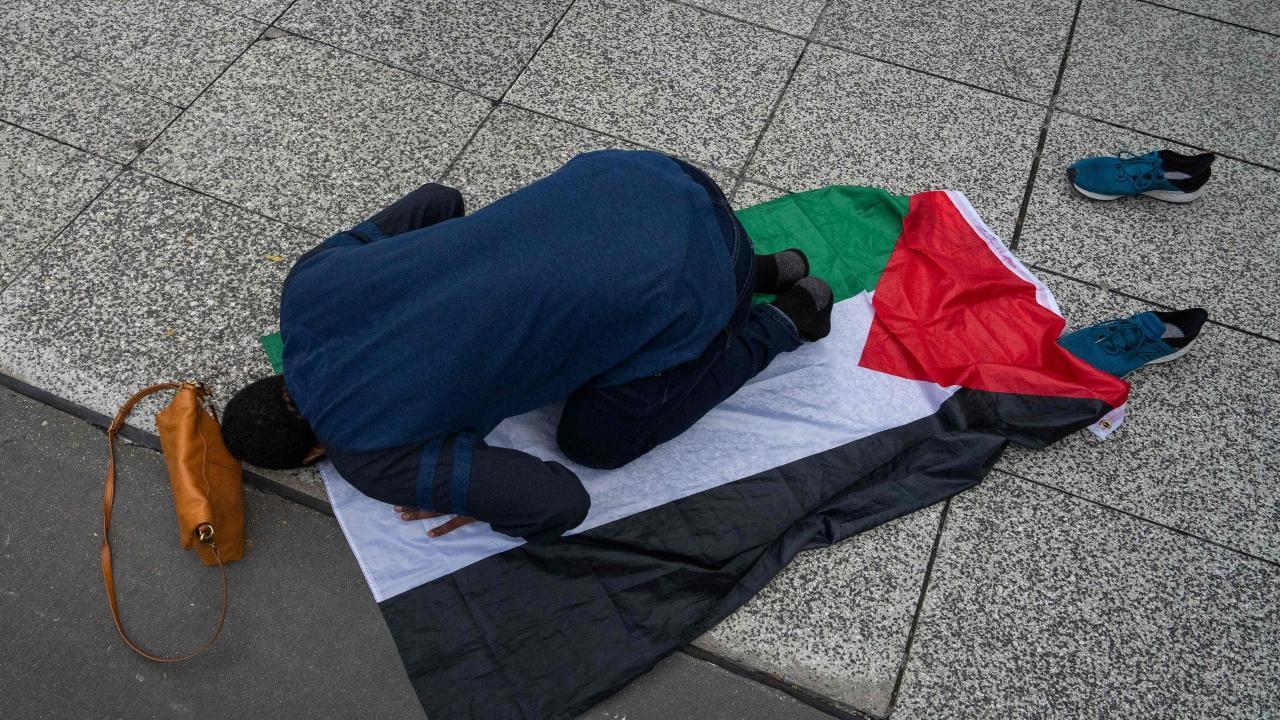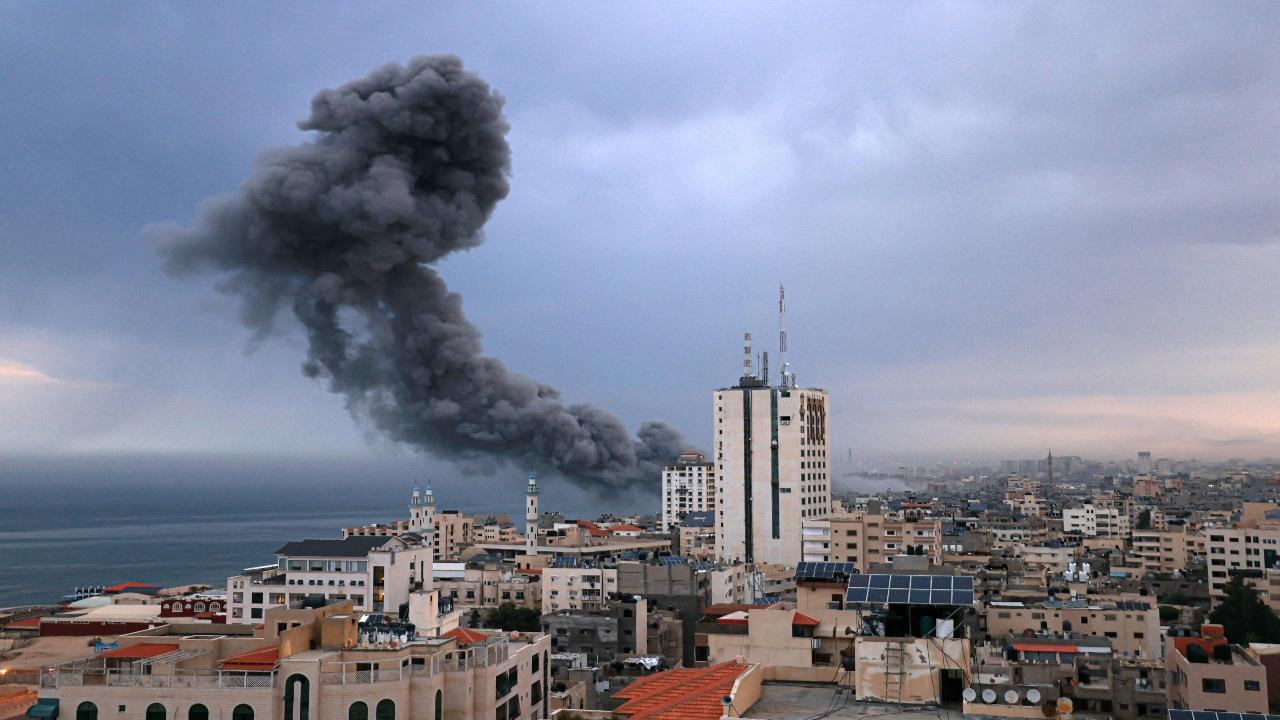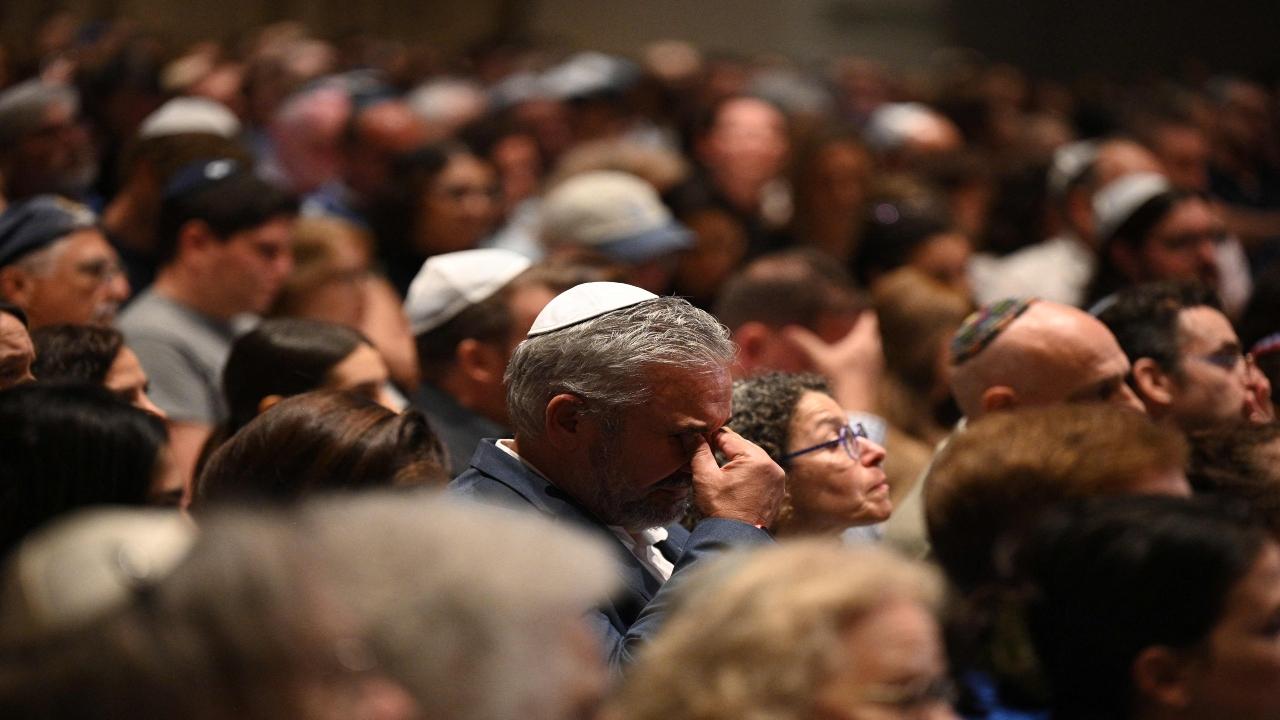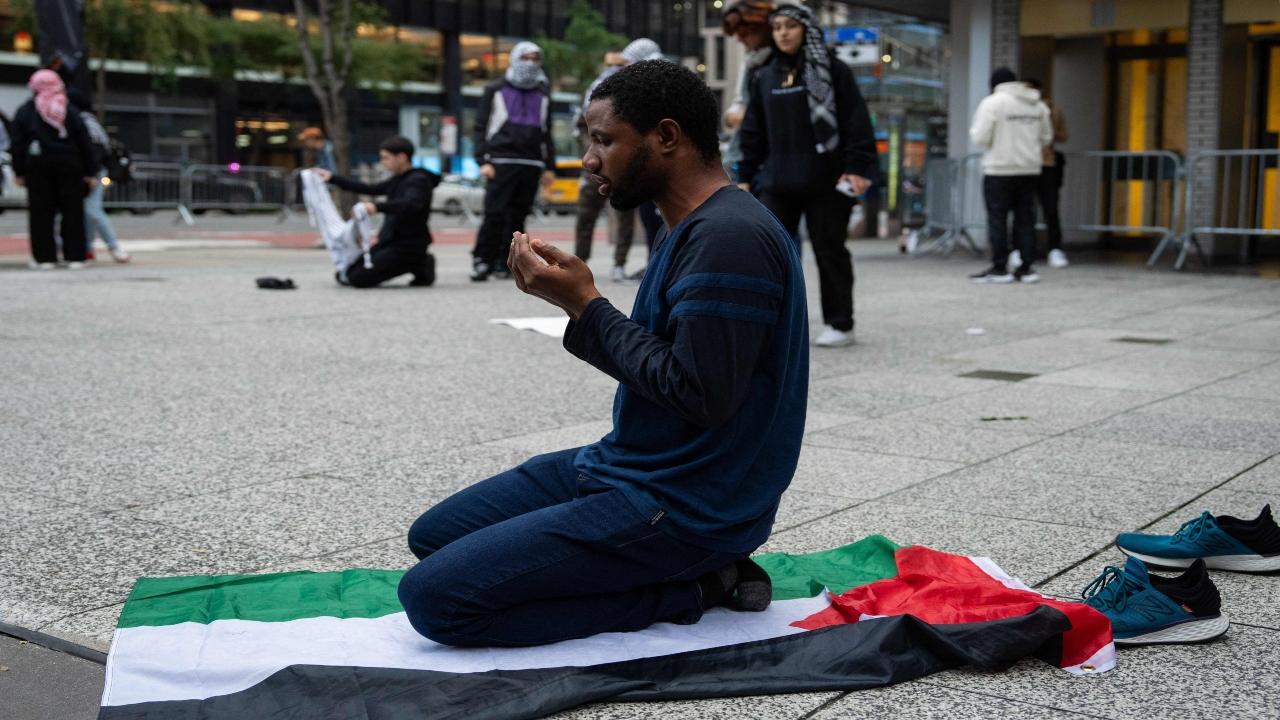The conflict between Israel and Palestinian armed group, Hamas, has escalated dramatically after the Israeli government declared war and intensified its bombardment of the Gaza Strip. Israel said the attack was in response to a major surprise attack by Hamas

A man prays on the Palestinian flag near the Israeli Consulate on October 8, 2023 in New York City. AFP
The conflict between Israel and Palestinian armed group, Hamas, has escalated dramatically after the Israeli government declared war and intensified its bombardment of the Gaza Strip. Israel said the attack was in response to a major surprise attack by Hamas. This weekend's incursion by Hamas and the subsequent assault by the Israeli defence forces resulted in significant casualties on both sides.
ADVERTISEMENT
Israel launched airstrikes, including one that levelled 14-story tower building allegedly housing Hamas office. The death toll rose significantly. Approximately 1,23,000 displaced people sought shelter in Gaza.
Key takeaways
War declaration: The Israeli government's formal declaration of war authorizes significant military actions against Hamas, raising questions about the possibility of a ground assault into Gaza, a move that has previously resulted in higher casualties.
International response: The United Nations Security Council (UNSC) met behind closed doors in an emergency session amid the war but failed to achieve the unanimity needed for a joint statement.

Smoke rise above buildings during an Israeli air strike, in Gaza City on October 9, 2023. AFP
The United States called on the council’s 15 members to strongly condemn Hamas. “There are a good number of countries that condemned the Hamas attacks. They’re obviously not all,” senior US diplomat Robert Wood told reporters after the session.
Protection of civilians: The conflict led to a sharp increase in the number of displaced Gazans taking shelter in schools converted into shelters. Concerns were raised about attacks on civilian infrastructure, including schools.
Causes of the attack: Hamas cited long-standing tensions, including disputes over the Al-Aqsa Mosque, Jewish settlements, and prisoner conditions. Recent violent protests, negotiations, and the economic crisis in Gaza contributed to the situation.
Also read: Indian Americans rally in support of Israel after Hamas' surprise attacks
Israel's internal challenges: The conflict occurred amid internal political turmoil in Israel, with protests against Prime Minister Netanyahu's proposals to weaken the Supreme Court.
Hamas's tactics: Hamas employed both rocket attacks and militant infiltrations, marking a significant departure from previous conflicts.
Understanding Hamas
As the situation unfolds, it is essential to understand who Hamas is, its origins, principles, allies, and the factors behind its recent attack on Israel.
Hamas stands for the "Islamic Resistance Movement" and translates to "zeal" in Arabic. It exercises political control over the Gaza Strip, a densely populated area blockaded by Israel and home to over two million Palestinians.

People attend a vigil for Israeli victims at the Stephen Wise Temple, in Los Angeles, California on October 8, 2023. AFP
Founding and early goals
Founded in Gaza in 1987 by Sheikh Ahmed Yasin and Abdul Aziz al-Rantissi, Hamas emerged during the first Intifada, a Palestinian uprising against Israeli occupation. Initially linked to the Muslim Brotherhood in Egypt, Hamas established the military wing, the Izz al-Din al-Qassam Brigades, with the primary goal of liberating historic Palestine.
Principles and recognition
Hamas does not recognize Israel's statehood but accepts the idea of a Palestinian state along the 1967 borders. It firmly opposes the Oslo Peace Accords and is dedicated to the establishment of a Palestinian state within its historical borders. This objective is pursued through armed resistance, targeting the Israeli military, settlers, and civilians.
International designation as a "terrorist" organization
Hamas, either as a whole or its military wing, is classified as a "terrorist" organization by Israel, the United States, the European Union, Canada, Egypt, and Japan.

A woman holds a sign during a pro-Israel rally outside of Israeli Embassy on October 8, 2023 in Washington, DC. AFP
Regional alliances and support
Hamas is part of a broader regional alliance that includes Iran, Syria, and Hezbollah in Lebanon. This coalition opposes US policies in the Middle East and Israel.
Triggers for Saturday's attack
Hamas initiated its military operation in response to longstanding Palestinian grievances, including atrocities committed over decades and perceived infringements on holy sites like the Al-Aqsa Mosque. These grievances provided the impetus for Saturday's attack, which Hamas views as a response to ongoing injustices.
Hamas spokesperson Khaled Qadomi told Al Jazeera that the group carried out its military operation in response to atrocities that Palestinians have faced over decades. “We want the international community to stop atrocities in Gaza against Palestinian people, our holy sites like Al-Aqsa [Mosque]. All these things are the reason behind starting this battle,” he said.
Targeting of civilians
Hamas maintains that it does not intentionally target civilians. However, videos have surfaced showing its fighters taking elderly Israelis hostage. Rights groups like Amnesty International have documented instances of Israeli civilians being killed by Hamas. Hamas justifies its actions by categorizing settlers in illegal settlements as legitimate targets rather than civilians.

A man prays on the Palestinian flag near the Israeli Consulate on October 8, 2023 in New York City. AFP
Israel-Palestine conflict: A historical perspective
The Israeli-Palestinian conflict has deep historical roots dating back to the late 19th century. Understanding this complex and long-standing dispute requires examining its key historical events, the major actors involved, and recent developments.
After World War I and the defeat of the Ottoman Empire, Britain took control of Palestine, a region with a Jewish minority and an Arab majority. The international community asked Britain to create a Jewish homeland there, which caused tension between the two groups.
In the 1920s and 1940s, many Jewish people moved to Palestine to escape persecution in Europe, especially after the Holocaust. This increased friction between Jews and Arabs, and they also resisted British rule.
In 1947, the United Nations voted to divide Palestine into separate Jewish and Arab states, with Jerusalem under international control. The Jewish leaders agreed to this plan, but the Arab side rejected it, and it was never put into action.
In 1948, the British left, and Jewish leaders declared the creation of Israel. Many Palestinians opposed this, and a war started. Neighboring Arab countries joined the conflict. Hundreds of thousands of Palestinians were forced to leave their homes, which they call "The Catastrophe."
Over the years, Israel and Palestine have had many conflicts, some small and some very deadly.
In 1987, a group called Hamas was formed as a political branch of the Muslim Brotherhood. They have been involved in conflicts between Israelis and Palestinians, including two major uprisings called "intifadas."
In 2000, there was a summit to try to make peace between Israel and Palestine, but it didn't work out.
Now, Hamas is urging fighters from the West Bank and other places to join the fight against Israel. Tensions are high in places like East Jerusalem, Gaza, and the West Bank.
Israel and Egypt control Gaza's borders to stop Hamas from getting weapons. This has caused a crisis in Gaza, with people struggling to get basic things like food and water.
Palestinians in Gaza and the West Bank say they suffer because of Israeli actions like the Gaza blockade, the West Bank barrier, and the destruction of Palestinian homes.
Israel says it's only defending itself from Palestinian violence. They point out that Hamas has fired many rockets into Israel, and Palestinian militants have attacked Israeli civilians.
Israel’s occupation of Palestinian Territory is apartheid: United Nations human rights expert
A UN expert, Michael Lynk, in 2022, urged the international community to acknowledge his report, echoing findings from various human rights organizations that Israel practices apartheid in the occupied Palestinian territory. Lynk described a discriminatory system favoring Israeli settlers over Palestinians, leading to a deeply segregated existence with oppressive conditions. He argued that this constitutes apartheid under international law. He also pointed out that Israel's actions are aimed at maintaining an illegal sovereign claim over occupied territory. Lynk emphasized the need for accountability measures to end apartheid practices and fulfill Palestinian rights, citing years of unheeded UN resolutions.
In September this year, former Mossad intelligence agency head, Tamir Pardo, has asserted that Israel is enforcing a system akin to apartheid on Palestinians in the West Bank, likening it to South Africa's former racial oppression regime. Pardo highlighted the stark contrast between legal systems for Palestinians under military law and Jewish settlers under civilian courts, declaring it an apartheid state. While Israel has typically dismissed apartheid accusations as antisemitic, dissent from within the Israeli establishment makes it harder to ignore. Pardo warned that the ongoing occupation threatens Israel's identity as a Jewish state. Other notable Israelis, such as former Attorney General Michael Ben-Yair and historian Benny Morris, have made similar apartheid comparisons, and prominent international figures have also invoked apartheid to describe the situation in the occupied territories.
 Subscribe today by clicking the link and stay updated with the latest news!" Click here!
Subscribe today by clicking the link and stay updated with the latest news!" Click here!







